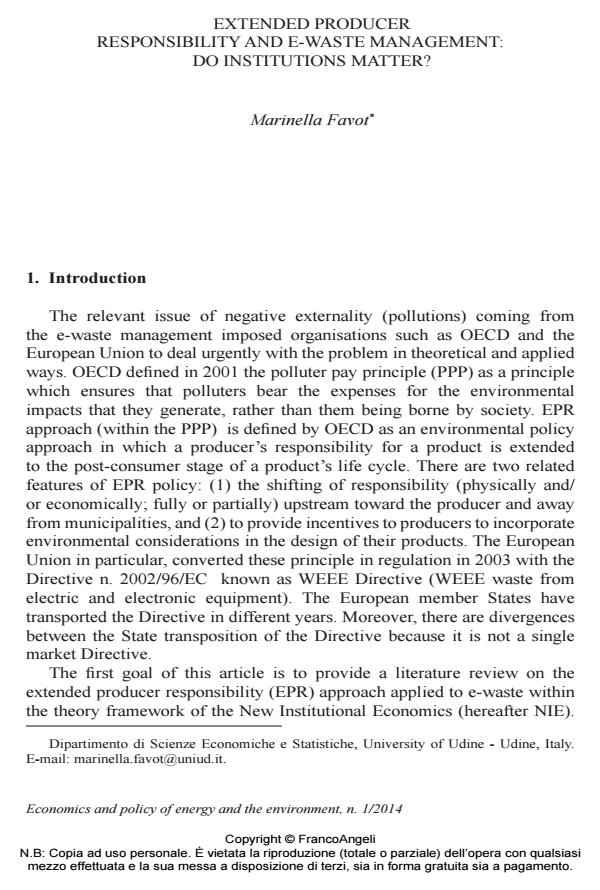Extended producer responsibility and e-waste management: do institutions matter ?
Titolo Rivista ECONOMICS AND POLICY OF ENERGY AND THE ENVIRONMENT
Autori/Curatori Marinella Favot
Anno di pubblicazione 2014 Fascicolo 2014/1
Lingua Inglese Numero pagine 22 P. 123-144 Dimensione file 210 KB
DOI 10.3280/EFE2014-001006
Il DOI è il codice a barre della proprietà intellettuale: per saperne di più
clicca qui
Qui sotto puoi vedere in anteprima la prima pagina di questo articolo.
Se questo articolo ti interessa, lo puoi acquistare (e scaricare in formato pdf) seguendo le facili indicazioni per acquistare il download credit. Acquista Download Credits per scaricare questo Articolo in formato PDF

FrancoAngeli è membro della Publishers International Linking Association, Inc (PILA), associazione indipendente e non profit per facilitare (attraverso i servizi tecnologici implementati da CrossRef.org) l’accesso degli studiosi ai contenuti digitali nelle pubblicazioni professionali e scientifiche.
WEEE (waste from electrical and electronic equipment, known also as e-waste) is the fastest growing category of waste with 50 million tons generated worldwide each year and it increases at a rate of 3-5% per year (Onyenekenwa et al., 2011). In Europe e-waste issue has been tacked with a specific directive named WEEE Directive (Directive 2002/96/EC). This directive includes a policy principle known as Extended Producer Responsibility (EPR). The novelty of this research is to relate New Institutional Economics framework to EPR and to analyse in detail the applications of EPR and the results. More specifically, we investigate how the European regulation on e-waste (that includes the EPR principle) changes the institutional settings according to different options available. One of these options regards the individual producer responsibility choice versus the collective producer responsibility alternative. This article also presents a case study on how the introduction of WEEE Directive in Italy has changed the financial, physical and informative responsibilities for producers and municipalities. One important result is that the target of collection of e-waste set at 4 kg per habitant per year by the Directive, was reached in 2010. We conclude that EPR changes the institutional settings and achieve the internalization of externalities. Moreover, we highlight that the results are related to the solutions adopted within the EPR principle. We also point out that the recast of the European Directive in 2012 redefined the collection targets of e-waste and Italy will face a big challenge in order to reach those new goals.
Parole chiave:PPP, Extended Producer Responsibility, EPR, e-waste, WEEE Directive, New Institutional Economics
Jel codes:Q53, Q55, D02
- THE IMPACT OF THE IMPLEMENTATION OF TEMPORARY IMPORT PROCEDURE ON ELECTRONIC PRODUCTS: INPUT--OUTPUT ANALYSIS Dedi Abdul Hadi, Toru Matsumoto, in JOURNAL OF ENVIRONMENTAL SCIENCE AND SUSTAINABLE DEVELOPMENT /2018
DOI: 10.7454/jessd.v1i1.4 - Future perspectives on the role of extended producer responsibility within a circular economy: A Delphi study using the case of the Netherlands Kieran Campbell‐Johnston, Maurits de Munck, Walter J. V. Vermeulen, Chris Backes, in Business Strategy and the Environment /2021 pp.4054
DOI: 10.1002/bse.2856 - Effective end‑of‑life (EOL) products management in mobile phone industry with using Twitter data analysis perspective Seyed Hamed Ghanadpour, Sajjad Shokouhyar, Mohadeseh Pourabbasi, in Environment, Development and Sustainability /2023 pp.11337
DOI: 10.1007/s10668-022-02529-7 - A simulation-optimization model for sustainable product design and efficient end-of-life management based on individual producer responsibility Mariam Ameli, Saeed Mansour, Amir Ahmadi-Javid, in Resources, Conservation and Recycling /2019 pp.246
DOI: 10.1016/j.resconrec.2018.02.031 - Regulation and competition in the extended producer responsibility models: Results in the WEEE sector in Europe Marinella Favot, Luca Grassetti, Antonio Massarutto, Raphael Veit, in Waste Management /2022 pp.60
DOI: 10.1016/j.wasman.2022.04.027 - Shifting perceptions of informal operators in the service and value chains: A retrospective of 40 years of observation and advocacy for informal recyclers and waste service providers, through the eyes of five global participant-researchers Michael Simpson, Kwaku Oduro-Appiah, Ellen Gunsilius, Sonia Maria Dias, Anne Scheinberg, in Waste Management & Research: The Journal for a Sustainable Circular Economy /2025 pp.850
DOI: 10.1177/0734242X241280076 - Italian waste in the circular economy: A agenda for industry regulators in Italy Antonio Massarutto, in ECONOMIA PUBBLICA 1/2019 pp.9
DOI: 10.3280/EP2019-001002 - Towards a framework to design product service system-based mobile phone waste management: A social media data analysis perspective Mohadeseh Pourabbasi, Sajjad Shokouhyar, in International Journal of Computer Integrated Manufacturing /2023 pp.260
DOI: 10.1080/0951192X.2022.2078510 - Economic analysis of e-waste market Prudence Dato, in International Environmental Agreements: Politics, Law and Economics /2017 pp.815
DOI: 10.1007/s10784-017-9350-4 - Institutional legitimacy of non-profit innovation facilitators: Strategic postures in regulated environments Filippo Corsini, Francesco Rizzi, Marco Frey, in Technology in Society /2018 pp.69
DOI: 10.1016/j.techsoc.2018.01.002
Marinella Favot, Extended producer responsibility and e-waste management: do institutions matter ? in "ECONOMICS AND POLICY OF ENERGY AND THE ENVIRONMENT" 1/2014, pp 123-144, DOI: 10.3280/EFE2014-001006